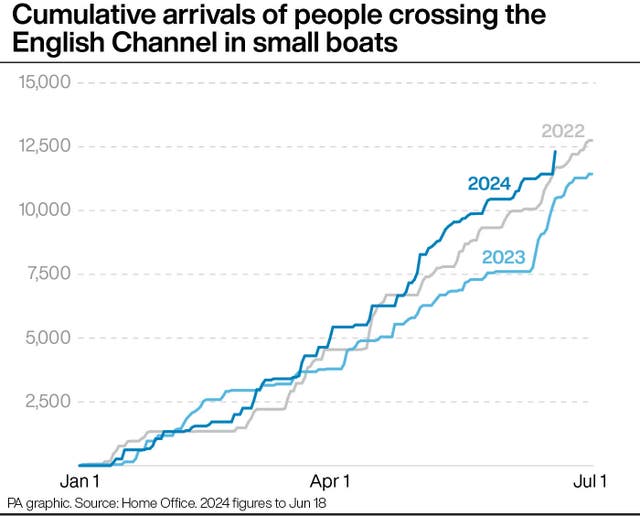Record arrivals see migrant Channel crossings top 12,000 for year so far
The Home Office said 882 people made the journey in 15 boats on Tuesday – the highest number in a single day this year.

More than 800 migrants arrived in the UK after crossing the Channel in a single day – a new record for the year so far.
The Home Office said 882 people made the journey in 15 boats on Tuesday, suggesting an average of 59 people per boat.
The latest crossings take the provisional total for the number of arrivals so far this year to 12,313.
This is 18% higher than this time last year when 10,472 crossings were recorded, and up 5% on the total at this stage in 2022 (11,690), according to PA news agency analysis of Government figures.
Tuesday’s crossings are the highest daily number of arrivals recorded since November 29 2022, when 947 people made the journey.
The highest single day total on record for Channel crossings since 2018 was reached on September 3, 2022 when 1,305 migrants arrived in the UK.
More than 2,000 arrivals have now been recorded since the General Election was called on May 22 (2,431), with immigration a key campaign battleground.
In the last six-and-a-half years as the recent migrant crisis unfolded, 126,658 people have arrived in the UK after crossing the Channel, data recorded since the start of 2018 shows.
Some 81,677 people have made the journey since the Government struck the stalled deal to send migrants to Rwanda in April 2022.
The tally of crossings since Rishi Sunak, who pledged to “stop the boats”, became Prime Minister in October that year is almost 50,000, now standing at 49,376.

But the Prime Minister insisted the Conservatives “can make a difference”.
Asked why people should believe he is the right person to tackle the crossings crisis in light of the latest figures, Mr Sunak told broadcasters in East Anglia: “There is always going to be days which are worse than others, but the choice at this election is about how do we solve this problem for good.
“I have got a plan to do that and that is about getting a deterrent up and running, removing the incentive for people to come here.”
The figures also prompted repeat calls from charities for an overhaul of asylum policies.
Steve Valdez-Symonds, Amnesty International UK’s refugee and migrant rights director, said: “People who are fleeing conflict and persecution are forced to make the perilous sea crossing because they have no other option to reach safety.
“The next UK government needs to radically change their response to people seeking asylum, including making safe routes available for people with family and other connections here.”
Safe Passage International chief executive Wanda Wyporska said: “If the next government is serious about protecting refugee lives and tackling the smuggling gangs, it must prioritise opening safe routes and helping refugee families to reunite in safety here.”
Deputy leader of the Liberal Democrats Daisy Cooper vowed the party would “reopen safe and legal routes” and suggested migrants could have certainty about their status when coming to the UK by making applications from abroad.
Speaking on a visit to Surrey, she told the PA news agency: “What we really need to see is safe and legal routes re-established because many of them were closed down, and that means around three-quarters of the people who are currently attempting to come here on small boats could actually apply from other countries and have their application dealt with in a safe way without them having to make that terrible, scary, risky journey.”
The figures come as the Public and Commercial Services (PCS) union threatened more legal action over the Government’s multi-million pound bid to cut Channel crossings by sending migrants to Rwanda.
Lawyers at firm Duncan Lewis sent a pre-action letter to Defence Secretary Grant Shapps, on behalf of the union which represents civil servants, putting him on notice of a legal challenge if he tries to arrange for his department to help fly asylum seekers to the east African nation.
There have been suggestions the Ministry of Defence (MoD) could be brought in to operate the flights amid difficulties agreeing charters with commercial airlines.
But the PCS union believes this could be against the law and Mr Shapps may not have the legal power required to order the department to become involved.
If he does not respond to the letter within seven days, the union said it will seek a judicial review.





